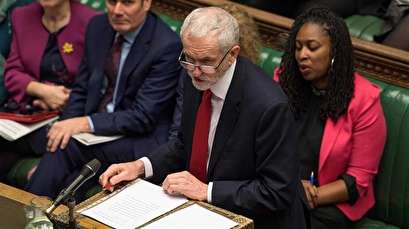May claimed on Monday that the EU had agreed to ''legally binding changes" to her Brexit agreement, which suffered an embarrassing defeat when it first came up for vote in January.
British Cabinet Office Minister David Lidington notified Parliament of the new development following negotiations between May and EU Commission President Jean-Claude Juncker in the French city Strasbourg earlier on Monday.
Lidington said the sides had agreed to a joint legally binding mechanism seeking to replace the so-called Irish backstop with alternative arrangements by December 2020.
“The EU cannot try to trap the UK in the backstop indefinitely, and that doing so would be an explicit breach of the legally binding commitments that both sides have agreed,” Lidington said.
However, Corbyn said Monday that the agreement did not address any of the concerns that lawmakers had raised about the original agreement and that May had “recklessly” wasted time she could use to save Brexit.
“Since her Brexit deal was so overwhelmingly rejected, the Prime Minister has recklessly run down the clock, failed to effectively negotiate with the EU and refused to find common ground for a deal Parliament could support,” he said.
“This evening’s agreement with the European Commission does not contain anything approaching the changes Theresa May promised Parliament and whipped her MPs to vote for,” Corbyn added. “That’s why MPs must reject this deal tomorrow.”
May refused to show up in Parliament following an urgent question by Labour leader Jeremy Corbyn about progress in the Brexit talks. Corbyn accused May's government of "delay", saying that it is now "time for answers."
Today, the lawmakers will vote on a motion to approve the new documents May presented last night.
Juncker insisted after the negotiations that if he would give London no “third chance” to renegotiate should the Commons once again vote down May’s deal.
In case of possible rejection, the MPs will first vote for extending Brexit deadline of March 29 and if that’s not approved, a vote for a no-deal Brexit will be held.
The backstop clause of the Brexit deal is an insurance policy designed to prevent the return of border checks between British-ruled Northern Ireland and Ireland, which is an EU member.
Critics of May's deal believe the backstop may trap the UK in the EU’s customs union indefinitely once the clause is triggered at the end of 2020.
 TEHRAN,
TEHRAN,